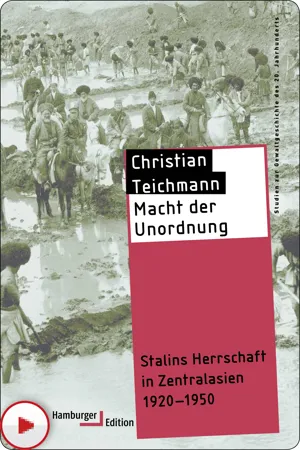
- 350 pages
- English
- ePUB (mobile friendly)
- Available on iOS & Android
About this book
Kein Land setzte im 20. Jahrhundert so vehement auf die künstliche Bewässerung als Mittel zur Ausbreitung staatlicher Herrschaft wie die Sowjetunion. Der Bau von Kanälen und Staudämmen veränderte überall im Land des Sozialismus das Zusammenleben der Menschen, ihre wirtschaftlichen Möglichkeiten und ihren Umgang mit der Natur. Das sowjetische Wasserbauprogramm begann 1920 mit Lenins "Plan zur Elektrifizierung" des Landes und gipfelte 1950 in Stalins "Plan zur Umgestaltung der Natur".Ein entscheidendes Element dieser Umgestaltung war Stalins Projekt der Baumwollautarkie, mit dem die zentralasiatische Peripherie in den Prozess der sowjetischen Staatswerdung integriert werden sollte. Zu diesem Zweck waren neue Grenzen und Institutionen, aber auch die Massenmobilisierung der Bevölkerung und vor allem technisches Know-how notwendig. Mithilfe künstlicher Bewässerung sollte eine industrielle Baumwollproduktion entstehen, um die Sowjetunion vom Import dieses wichtigen Cash Crop unabhängig zu machen.In Stalins Sowjetunion beruhte die Staatswerdung nicht allein auf der Neuordnung der Verhältnisse, ihr leitendes Prinzip war vielmehr das Schaffen von Unordnung. Zudem unter- minierten Willkür, Terror und Chaos jegliche Handlungs- und Erwartungssicherheit. Im sowjetischen Baumwollstaat wurde Unordnung zum zentralen Instrument der Herrschaftssicherung. Gleichzeitig machte sie die größte Schwachstelle der Staatsbildung aus. Paradoxerweise definierte die Macht der Unordnung die Durchsetzungskraft des Staates ebenso wie seine eng gezogenen Handlungsgrenzen.
Frequently asked questions
- Essential is ideal for learners and professionals who enjoy exploring a wide range of subjects. Access the Essential Library with 800,000+ trusted titles and best-sellers across business, personal growth, and the humanities. Includes unlimited reading time and Standard Read Aloud voice.
- Complete: Perfect for advanced learners and researchers needing full, unrestricted access. Unlock 1.4M+ books across hundreds of subjects, including academic and specialized titles. The Complete Plan also includes advanced features like Premium Read Aloud and Research Assistant.
Please note we cannot support devices running on iOS 13 and Android 7 or earlier. Learn more about using the app.
Information
Table of contents
- Cover
- Studien zur Gewaltgeschichte des 20. Jahrhunderts
- Titel
- Impressum
- Inhalt
- 1 Rotes Land, Weißes Gold – Künstliche Bewässerung, Baumwollwirtschaft und der sowjetische Staat
- 2 Koloniale Revolutionen – Zentralasien zwischen Zaren und Sowjets, 1885–1922
- 3 Grenzen ziehen, Wasser teilen – Moskau und die indigenen Eliten, 1923–1929
- 4 Fußvolk mit Eigensinn – Ingenieure und Bolschwiki,1923–1929
- 5 Eine Zeit der Wirren – Forcierter Baumwollanbau und Kollektivierung, 1929–1932
- 6 Utopie im Ausnahmezustand – Ein Großbau in Tadschikistan,1930–1937
- 7 Planerfüllung ohne Plan – Baumwollwirtschaft und Staatsterror, 1933–1937
- 8 Kriegslandschaften – »Volksbaustellen« und der Zweite Weltkrieg, 1937–1950
- 9 Macht der Unordnung – Ein Resümee
- Anhang